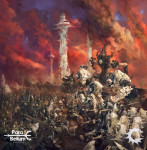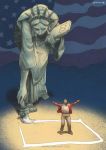Rick Wayne's Blog, page 18
July 6, 2020
Weights and Measures
From our throne here at the pinnacle of the present, the reforms of the past seem rather quaint. We read in grade school history textbooks, for example, that it was quite an achievement for Hammurabi, an absolute monarch, simply to standardize weights and measures.
It mattered, of course, because goods are sold at market by weight. When there is no standard definition of, say, a pound or a cup, merchants are free to use whatever minimal definition suits them, including one of their own devising, which is exactly what they’ve done in all times that allowed it. There is little as constant as human greed.
No sooner were there markets — literal ones in this case — than there were pickpockets on both sides of the stall. It’s easy to throw the street thief in jail. The “cost” of policing him is slight. It takes genuine moral courage to address the other.
We now take it for granted that there is not only a precise, universal, verifiable definition of a kilogram — originally, the weight of a thousand cubic centimeters of water — but also that there is a public body whose job it is to oversee that definition. (They recently approved a change after it was discovered the slug of metal used as the benchmark for a kg had eroded over the centuries to be 50 micrograms lighter than a thousand cubic centimeters of water. The new definition, approved last year, uses Planck’s constant.)
One of the chief lessons of the past is that there is not much difference between us and the humans of Hammurabi’s time. This is difficult for people to accept, even where they may cognitively agree. Nationalist histories, of the kind most of us learned in school, at least strongly imply an exceptionalist account of the present, where the nation is virtue instantiated and the end result of a great drama, shining above us both unquestionably strong and yet (paradoxically) constantly imperiled.
It’s hard to convince young people to sacrifice for the body politic — which is often required for its survival — if there’s nothing particularly historic or exceptional about it, which may objectively be the case. That means the lie is necessary anywhere the nation is false, where it’s not actually ours. If it were, any of us would defend it as readily as we do our families, without considering whether they are “the best in history.”
Over the past 30 years, an entirely new market has appeared: the digital market. Predictably, pickpockets appeared on both sides of the stall. Once again, we were quick to outlaw the petty thief. Police routinely cooperate internationally to take down pirate sites, for example, despite that their impact on the economy is so slight, it’s almost impossible to measure.
We’re struggling to pass even the most basic digital equivalent to weights and measures — same as the humans in Hammurabi’s time, who were no more or less noble.
Future generations, looking back on us from the throne of the present, which we must soon abdicate, will note that we had so little faith in our democratic institutions that the major outcry now is for companies like Facebook and Google to regulate themselves, which they are struggling to do.
This is something previous generations never would’ve contemplated for banks or pharmaceutical companies. You either believe there was a reason for that or you don’t.
July 5, 2020
July 4, 2020
(Art) The High Goddesses of Othon Nikolaidis
[image error]
Greek artist Othon Nikolaidis paints some of the most epic fantasy heroines I’ve seen.
Find more by the artist on his ArtStation page.











July 1, 2020
(Art) The Scathing Social Satire of Daniel Garcia
[image error]
The satirical illustrations of Daniel Garcia pretty much speak for themselves. No matter who you are, odds are there will be something here to offend.














June 30, 2020
Tomorrow
Prior to WWII, the US had a marginal presence overseas. We now have over 800 military bases in 70 countries around the globe — more than any nation in history — including 174 in Germany, 113 in Japan, and 83 in South Korea.
Concomitant with that was a thousand-fold increase in the size of our “intelligence services,” which behaved so badly in the decades after the war that no less than three Congressional committees were established to investigate.
The 1978 Foreign Intelligence Surveillance Act, which established the FISA court, was the direct response. The intent was increased oversight. The result seems to have been to make Congress an accessory.
This situation is such a significant departure from earlier periods of American history that Eisenhower felt compelled to warn us about it in his farewell address, where he coined the phrase “military-industrial complex.”
Since 1945, the number of years the US has been actively shooting or bombing people overseas vastly exceeds the reverse. We exist in a near-constant state of simmering warfare augmented by a hyperactive espionage apparatus.
It’s so pervasive that we’re numb to it. In all the debates about Guantanamo Bay — a name now synonymous with the extra-legal detention center, despite that it takes a mere fraction of the entire facility — no one questioned the need for the base itself.
People in a hurry to label and attack will take that to mean I am against the military or something. People don’t evaluate what you say anymore, if they ever did. (I’m skeptical.) They decide which direction it points and drop you at the extreme.
But it’s important: At no point in the national debate did the base itself ever come under discussion. A constant, active military presence in foreign countries around the globe is just an assumed part of life in post-war America, which we should start calling pre-war America.
It’s possible the alternative was worse. But even if that’s so (and we can at least question it), constant, active espionage & warfare — which, after 9/11, trickled down to a paramilitarized police — surely comes at a cost.
Misinformation, for example. Politicians have never been known for their honesty, but there used to be a difference between politics and espionage. President Lincoln used bribery to get the 13th Amendment through Congress, but at no point was anyone in doubt as to his intentions.
In warfare, even your ends must be disguised, as well as what and how much you know. Just look at Turing’s cruel calculus.
There is a certain sense in which nuclear weapons and the specter of total annihilation have contributed directly to our post-factual world. They have facilitated the largest engine of obfuscation in history and put it in the hands of “peacetime” government, which developed it as a core competency.
The examples of its known use are too many to mention: Iran/Contra, the manufacture of WMD in Iraq, the “reformation” of Col. Qaddafi, Jeffrey Epstein’s suicide… The unknown uses must surely appall us.
The goal, always, is stability — for fear that any upset of the apple cart will result in total catastrophe. The result, however, is stasis. Politicians no longer inaugurate change because that is not their mandate. They are, first, managers.
It genuinely doesn’t matter what is true so long as you get up tomorrow and do the same thing you did yesterday.
June 29, 2020
(Art) The Fairy Illustration of Ed Binkley
[image error]
American artist and illustrator Ed Binkley has been featured numerous time in Spectrum, the annual anthology of the best in fantastic art. I got the chance to go to the Spectrum con in Kansas City several years ago. Definitely worth it to do at least once.
Binkley’s remarkably crisp line art, done mostly in colored pencil and acrylic, is simple stunning — so much so that he manages to breathe a freshness and realism into characters and material that are hundreds of years old: fairies and goblins and wayward children in the forest.
Find more by the artist on his ArtStation page.















June 28, 2020
(Fiction) Anything Other Than a Spy
T Minus: 051 Days 21 Hours 03 Minutes 43 Seconds
That was odd.
The door was already open.
Dr. Amarta Zabora removed the key to her office and pushed the door with her knee. It was heavy, designed to keep the voices inside from being heard in the hallway, and she lost her balance for a moment. It didn’t help that she had a purse hanging from one arm and a stack of files in the other. She was tired of carting hard copies between work and home. She couldn’t wait for the new secure system.
The sun shone through windows on the left. A woman was sitting behind the desk, her desk, reading her computer screen. Amarta stood in the door, shocked. The woman was African-American, 30-ish, with short, straightened hair pinned to her scalp and a simple striped jacket and slacks. She didn’t even look up.
“Excuse me.” Dr. Zabora objected. Her hair wasn’t nearly as well-kept as the intruder’s. “Who the hell are you?”
“Relax, Doctor.” The woman clicked the mouse. She didn’t turn. “I’m one of the good guys.”
“What’s that supposed to mean?” Amarta dropped her purse and files on the floor of her office and stepped forward. Everything scattered across the taupe carpet. “You’re not supposed to be in here.” She looked at the half-turned screen. “Those files are confidential!”
“Calm down, Doctor. Please. Have a seat.”
Amarta put her hands on her wide hips, then crossed her arms. It bunched her white coat. She stared. She was a head shorter than the interloper, with a round face and the dark complexion of her ancestors. Scraggly strands of gray poked from her jet-black hair. She kept staring as if to say, but you’re in my seat.
The intruder stood and smiled. “My name is Ayn.” She extended a hand across the bare wooden desk.
Dr. Zabora cleaned her desk every day before she left. She kept her arms crossed. She knew what was happening. She was a psychiatrist after all, trained to diagnose on all kinds of personal cues, appearance and behavior and the rest of it. “Ayn” was an anomaly. Genial people wear a wedding ring or they have a cowlick or shoes scuffed from a slight pigeon toe. Or maybe their necklace dangles a cross or a locket or Grandma’s old pearls. Normal, healthy people have tiny tells, subtle hints of personality that might be useful in therapy.
Ayn didn’t have any of that. She was dressed like an average office professional. Every piece of clothing was off the rack, appropriate but ordinary. Her make-up was appropriate but ordinary. Her hair was neat but ordinary. She wore a simple gold chain. Her earrings were simple dots. Her shoes were clean, round, ordinary. She was a mean, a calculated average. Everywoman.
Ayn pulled a blue tri-fold from her jacket. “This is an order from the Judge Advocate General’s office giving me access to all notes and files on one of your patients.”
Amarta didn’t take it. She walked around the desk and waited for Ayn to move. Apparently they were having a battle of wills. It’s too early for this, she thought. On a Sunday.
Ayn smiled again and set the order on the desk. She walked past the doctor slowly and settled into the visitor chair near the window.
Dr. Zabora sat and sighed. Her seat was still warm. It annoyed her. It would take half an hour at least to fix all the files she’d left scattered on the floor. That annoyed her, too. She glanced at her computer screen and then picked up the tri-fold. “What’s this about?” She opened the packet of papers.
Ayn waited for her to finish reading.
Amarta flipped from one page to the next, then tossed the packet across the desk.
Ayn folded it and put it back in her jacket. “What do you know about Captain John Regent?”
“Not as much as I should. His service record has been heavily redacted.” It was an accusation.
“Did he ever discuss the circumstances of his capture with you?”
Dr. Zabora shook her head. “John has been reluctant to talk about anything but his family.”
“Is that unusual for these military types?”
Military types. Amarta repeated it in her head. “Ayn” wasn’t a soldier. And she hadn’t dropped any credentials, which meant she probably wasn’t a lawyer either. They’re always quick to share.
Dr. Zabora sighed. “What’s that supposed to mean?”
“Oh come on. You know how it is. All these big, tough boys keeping their feelings buried under a mountain of rage.”
Ayn was baiting her. “Captain Regent isn’t like that.”
“No?”
“He’s respectful. Intelligent. Very well liked by the staff.”
“But?”
“What do you want, Ayn?”
“How long have you been here, Doctor? At this hospital?”
“Something tells me you already know the answer to that question.”
“You’ve been a contractor with the DoD for fifteen years. Where were you stationed before?”
“I didn’t see anything in your court order about me.”
Ayn smiled again and sat back. “Doctor Zabora, can I call you Amarta?”
“Sure.”
“Amarta, let’s be open with each other.”
“That would be a nice change.”
“You and I are never going to be friends. We’re never going to exchange bundt cake recipes or share wedding pictures. I don’t care if you like me or not. But I have a job to do, and it requires your assistance.”
She stopped short of a threat.
Ayn continued. “You were stationed in San Diego before this, correct?”
Amarta knew exactly where Ayn was going.
“That’s a long move, coming all the way here to Philly, especially with your whole family still in Southern California.”
“Ayn? Can I call you Ayn? I assume so since you haven’t bothered to give me your real name.” Dr. Zabora sat forward and rested her hands on her desk. “I’m a board-certified psychiatrist specializing in the treatment of post-traumatic stress disorder. I also have a master’s degree in cognitive psychology and nearly two decades’ experience playing mind games, like this, with some of the smartest and most heavily damaged psyches in the world.”
Ayn waited.
“Let’s pretend that you artfully steered the conversation to Sergeant Wilkins and the shooting and I’ll stipulate that he’s the reason I was moved here and that it was a tragedy and that that whole episode continues to cast a shadow over everything I do. Yes, I think about him every day. Yes, I wonder if there was something I missed. No, I am not suffering a crisis of confidence because of it.”
“Is that what you think I meant?”
“Do you really want to know what I think?”
Ayn motioned for Amarta to continue.
“I think it’s very easy to manipulate people when you genuinely don’t care about them. At all.”
“Are you saying I’m a sociopath, Doctor?”
“Isn’t that what the NSA looks for?”
Ayn didn’t acknowledge the acronym. She simply rested both hands on her knee and gave a patronizing, mock-patient look.
Dr. Zabora could feel her heart rate increase. “You’re not a soldier. You’re not with JAG. The CIA doesn’t work domestically. Shall I keep going?”
“Your intelligence was never in question, Doctor.”
“Just my competence.”
“It’s a fair question given what happened.” Ayn was serious.
Amarta took a deep breath and looked out the window at the green lawn that surrounded the campus. Beyond that, the city.
It never ended. It would never end.
Ayn went for the throat. “Sergeant Wilkins killed three people. And himself.”
Dr. Zabora looked back from the window. “Get to the point, please.”
“Doctor, do you know what Captain Regent is?”
“Yes. He’s a man in pain.”
“No. He’s a weapon. And it’s my job to determine whether he poses a threat.”
“That’s funny.” Dr. Zabora glowered. “I thought that was my job.”
“See?” Ayn opened her hands wide. “We’re on the same side after all.”
Amarta lowered her voice. “Why are you here?”
“We need time to complete our investigation.”
“Yesterday he asked to be discharged.”
Ayn nodded.
Amarta wondered how long they’d been “investigating” him, reading her reports without her knowledge. Sometimes she really hated working for the military. Sometimes it was the most rewarding job in the world. “He has family coming to pick him up tomorrow.”
“That’s wonderful. Family is important.”
“He’s not a prisoner.”
“And we’re not asking you to treat him like one. According to every official U.S. Army report, Captain Regent is a real American hero. Officially.”
“The most I can do is hold him for seventy-two hours. IF I feel he is a threat to himself. Or others.”
“We’re not asking you to do anything you’re not comfortable with.”
Yes, you are, Amarta thought.
Ayn sensed the hesitation. “I can’t give you details, of course. But I can tell you this. After walking out of a very, very secret base of operations, Captain Regent was captured by forces unknown and held for not less than six months and not more than eighteen. In that time, he was tortured and beaten and made to endure—”
Dr. Zabora interrupted. “The fracture patterns on his femur, tibia, and fibula indicate his legs were broken, repeatedly, with some kind of precision tool and then allowed to heal. The contact marks and burn pattern on his skin suggests he was hooked up to a generator or battery while being drenched in gasoline. His face was burned with aci—”
“We’ve read the same reports, Doctor.”
“Really? How wonderful. Then you know he’s suffered enough. He’s in constant pain.”
“And yet he refuses medication.”
Amarta rubbed her cheeks in frustration. Give me a suicidal patient any day. Anything other than a spy.
Ayn didn’t stop. “I’m not board-certified in anything. I didn’t go to Berkeley.” She nodded to Amarta’s degrees on the wall of the office. “I just went to some plain ol’ state college down South. But I read something recently. Maybe you can tell me if it’s true.”
Dr. Zabora waited.
“Patients engaging in masochistic behavior are often punishing themselves for something. Is that right?”
“It’s not that straightforward.”
“But it is a possibility.”
Amarta didn’t answer.
“Doctor, whether you are or not, a lot of very smart people are bothered that Captain Regent refuses to state why he went AWOL. Or who his captors were.”
Dr. Zabora looked down at her desk and waited for Ayn to finish her sales pitch.
“You probably don’t know this, but he was found dragging himself, one-armed, through a desert two hundred miles from his last known location. Barely alive.”
Amarta looked up. “I’m guessing that was in a part of the world we’re not supposed to be in.”
Ayn ignored the quip. “And no one has any idea why a highly decorated soldier with an impeccable service record suddenly walked off the reservation. We don’t know where he was or who took him or why they let him go.”
Amarta snorted. “Or what he told them while he was gone.”
Ayn paused. “That, too.”
Dr. Zabora took a deep breath and exhaled. John’s service record had more black line than text. It was obvious he had seen things, secret things, embarrassing things. The cynic in Amarta wondered if that’s why they let him come home. They needed him to relax, get comfortable, so they could uncover what he revealed. And to whom.
Otherwise they would have just eliminated him.
And now the powers-that-be wanted Amarta to declare him a risk to himself and hold him at the hospital. They would need a judge’s ruling to keep him more than seventy-two hours, but she guessed that would be plenty of time for a well-connected agency to find one.
They didn’t care about John, she knew, and they were holding Derek Wilkins over her head, giving her an “excuse.” Better to be safe, right? Better not to risk another soldier with PTSD snapping and taking a service sidearm to his family. And then himself. No one would contest her decision.
Amarta knew this was just the first round. If she refused, she’d find her career threatened. And after that . . .
Ayn could see the conflict on Dr. Zabora’s face. She stood. “I’m going to interview the staff. But I’ll be around. Do let me know what you decide. Just don’t take too long.”
Dr. Zabora looked up at the dark woman. Ayn wasn’t going to leave until Amarta did what they wanted. Amarta watched as the spy stepped over the pile of spilled files and walked out the door. She took another deep breath.
Poor John. After everything he’d been through, everything he’d done to survive, to escape, to get home, it still wasn’t over.
Now his own country was after him.
a snippet from Episode One of THE MINUS FACTION, available for free.
June 26, 2020
(Art) The Cyber-Wraiths of Filip Bazarewski
[image error]
Polish artist digital artist Filip Bazarewski has a talent for distorted or missing faces. His work runs the gamut of fantastic art from high fantasy to cyberpunk. Find more by the artist on his ArtStation page.













June 25, 2020
(Curiosity) How to Make an EMP Weapon
It’s not hard. It’s not as easy as, say, baking a cake, nor even as easy as assembling IKEA furniture, but it’s definitely closer to those than to making a nuclear bomb. No exotic materials are required, for example. You could find everything you need at the local hardware store.
There are three components: the emitter, the power source, and the antenna. The latter is hopefully self-explanatory. The emitter, called a vircator, is basically a magnetized metal vacuum tube with a wire mesh inside. Electrons from the power source cycle near the mesh, resonating at microwave frequencies.
The power source, called a flux compression generator, is more interesting. It’s a single-use device that destroys itself as it converts chemical energy to kinetic energy to electromagnetic energy. An explosive in a tube forces a magnet through a solenoid like a piston, creating a very short (~150 nanosecond), very powerful spike of current, which is converted by the vircator into a microwave burst.
[image error]
The US military was testing bombs that do this over a decade ago. Such bombs do no physical damage (other than at the point of impact) but will fry computers, vehicles, and communication devices in the affected area.
Domestically, a malicious actor could take out a hospital or air traffic control tower or all the cars on a stretch of highway. In fact, if you used a standing power source — which would currently be quite bulky but which one day might be portable, as in the cover image by Tom McDowell — you could make a microwave beam weapon that could safely disable a fleeing vehicle. I expect police will use them to make car chases a thing of the past.
The point is, any reasonably intelligent person willing to learn a little electrical engineering could create widespread mayhem with a handful of homemade EMP weapons placed strategically around a major city. One day, I’m sure, there’ll be a YoutTube video.
And yes, this figures into my latest book, a sci-fi mystery that takes place in the middle of this century but which is very much about life in the future-now. Widespread micromanufacture (think 3D printing evolved) and home CRISPR kits put advanced technologies in the hands of ordinary people, who don’t always use it for good.
I’ve been calling it “rural punk” because it contains a number of recognizable cyberpunk elements, but unlike a typical entry in that genre, most of the story takes place in small towns, which, even in the future, will still make up the majority of the physical space of the world.
It also includes elements of the occult, a heavy dose of conspiracy theory, dinosaurs, clones, body modding, a sentient orbital nuclear platform, an endemic (rather than epidemic) zombie disease, and it opens with a murder that isn’t a murder.
For those interested in beta-reading, I will be sending it out this weekend. Just shoot me an email at: RickWayneAuthor@gmail.com.
June 23, 2020
(Art) The Cyber-Wraiths of Filip Bazarewski
[image error]
Polish artist digital artist Filip Bazarewski has a talent for distorted or missing faces. His work runs the gamut of fantastic art from high fantasy to cyberpunk. Find more by the artist on his ArtStation page.
















